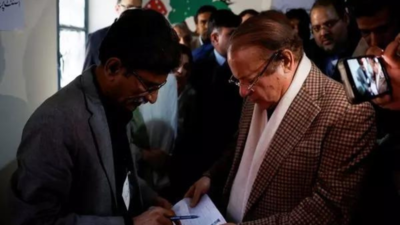10 Feb 2024 - {{hitsCtrl.values.hits}}
 BRUSSELS: Amid reports of rigging in Pakistan general elections conducted on February 8, the European Union has "regretted" the lack of a "level playing field" for leaders of all political parties referring to restrictions on former Prime Minister Imran Khan's Pakistan Tehreek-e-Insaf party (PTI).
BRUSSELS: Amid reports of rigging in Pakistan general elections conducted on February 8, the European Union has "regretted" the lack of a "level playing field" for leaders of all political parties referring to restrictions on former Prime Minister Imran Khan's Pakistan Tehreek-e-Insaf party (PTI).
As official results from Pakistan general elections showed independents backed by Imran Khan taking the lead howver, three-time former leader Nawaz Sharif has claimed his party emerging as leading the mandate.
The country's National Assembly has a total of 266 elected members. A party or a coalition needs 134 seats to win.
In a statement by the High Representative on behalf of the European Union on the general elections, the EU took note of the completion of the polling in the general elections, which took place on February 8 in Pakistan, following several months of postponement and uncertainty and in the context of a tense security environment.
"We regret the lack of a level playing field due to the inability of some political actors to contest the elections, restrictions to freedom of assembly, freedom of expression both online and offline, restrictions of access to the internet, as well as allegations of severe interference in the electoral process, including arrests of political activists," the statement added.
Independent candidates, mostly backed by Pakistan Tehreek-e-Insaaf (PTI), are leading with 52 seats, according to the provisional results released by the Election Commission of Pakistan (ECP) so far, Dawn reported.
The ECP has released the provisional results for 120 out of 266 seats of the National Assembly.
While PTI-backed independent candidates are leading on 52 seats, PML-N is a close second with 40 seats, followed by the PPP with 19 seats.
The unofficial results by Geo News for 204 seats have shown the independent candidates leading with 87 seats. They are being followed by PML-N at 60 seats and PPP at 45 seats.
"We therefore call upon the relevant authorities to ensure a timely and full investigation of all reported election irregularities and to implement the recommendations of the upcoming EU Election Expert Mission report," the EU also said.
According to the EU statement, the authorities were faced with the "challenging task of countering serious terrorist threats and attacks".
The EU also condemned all acts of violence, which took place in the lead-up to the elections and called on all parties and actors to use peaceful and democratic mechanisms to settle differences, refraining from further violence.
"The EU attaches paramount importance to political pluralism, democratic values, independent media, vibrant civil society, judicial independence and international human rights standards, which are key for democratic elections. We call on all political actors in Pakistan to engage in a peaceful and inclusive dialogue aiming at the formation of a stable government and to respect human rights in line with the Constitution of the Islamic Republic of Pakistan, as well as with international treaties to which Pakistan is party," the statement also noted.
Notably, former Pakistan PM Imran Khan, currently incarcerated, was disqualified from contesting the elections due to criminal convictions. The electoral symbol of the PTI was also taken away by the ECP in a ruling later backed by the Pakistan apex court. As a result, the PTI leaders and supporters contested as independent candidates, Dawn reported.
The participation by the Pakistpeople to exercise their right to vote, despite systemic barriers still faced by women and persons belonging to minorities, demonstrates their commitment to democracy and the rule of law. The EU welcomes the increased number of women registered to vote compared to the last elections, it also said.
EU also urged Pakistan to "continue reforms in the areas of human rights, good governance, as well as labour rights and environmental standards, to address the shortcomings outlined in the GSP+ report of November 2023, and to continue the necessary economic reforms".
05 Nov 2024 26 minute ago
05 Nov 2024 2 hours ago
05 Nov 2024 2 hours ago
05 Nov 2024 3 hours ago
05 Nov 2024 4 hours ago